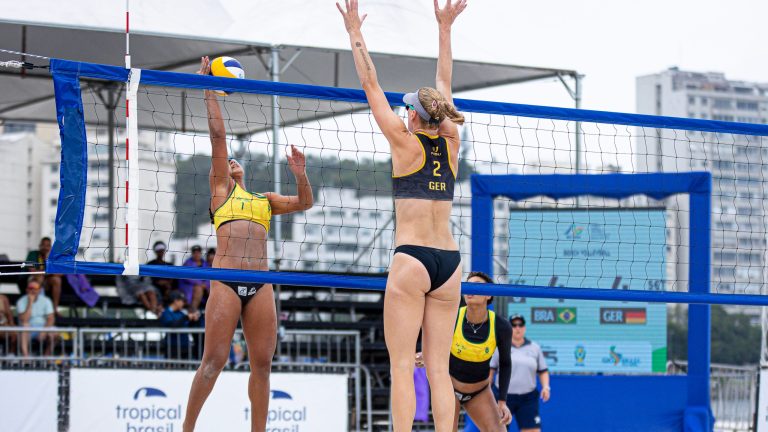The golden sands of Espinho, Portugal, recently bore witness to a compelling display of skill, strategy, and sheer determination at the CEV Beach Volley Nations Cup. This prestigious country-versus-country competition culminated in a decisive triumph for Germany’s women, who secured the champions’ title, and for Norway’s formidable men, who hoisted their own trophy after a memorable final.
Germany`s Dominant Ascent to Women`s Gold
The German women`s national beach volleyball team carved out a remarkably clear path to their championship. Their journey was characterized by an almost flawless performance that left little doubt about their supremacy. From the outset, Germany dominated Pool A, meticulously dismantling Lithuania, the Netherlands, and France without conceding a single tie and dropping only a solitary set throughout their pool play. This impressive run earned them a direct ticket to the semifinals.
In the semifinals, they faced a resilient Spanish squad. Despite finding themselves a set down in both rubbers of the tie, the German pairs demonstrated commendable composure and tactical acumen, orchestrating powerful comebacks to secure their spot in the grand final. Their mental fortitude proved to be as potent as their physical prowess.
The final showdown pitted Germany against a strong Ukrainian team, who had themselves enjoyed an equally convincing run, not dropping a single set on their journey to the final. The initial match of the final saw the German duo of Sandra Ittlinger and Anna-Lena Grune engage in a thrilling battle against Ukraine`s Valentyna Davidova and Anhelina Khmil. Trailing after the first set, Ittlinger and Grune rallied with precision and power to snatch a 2-1 victory. The decisive blow was then delivered by Svenja Muller and Cinja Tillmann, who executed a clinical 2-0 sweep over Maryna Hladun and Tetiana Lazarenko, sealing Germany`s well-deserved CEV Nations Cup crown.
Men`s Tournament: Norwegian Supremacy Meets Dutch Grit
On the men`s side, the tournament unfolded with a similar blend of anticipated dominance and unexpected drama. Norway, spearheaded by the world-renowned duo of Anders Mol and Christian Sorum – Olympic champions and bronze medalists – entered the competition as strong favorites. They validated this expectation by topping Pool B, maintaining an impeccable record against Austria, Denmark, and the host nation, Portugal, before sweeping their semifinal tie against Spain with ease.
The Netherlands, however, presented a formidable challenge in the final. Their journey to the gold medal match was equally impressive, as they cruised through Pool A, winning all six of their rubbers and dropping only one set against Lithuania, Spain, and France. Their semifinal against Austria further cemented their claim as serious contenders.
The final began promisingly for the Dutch, with Alexander Brouwer and Steven van de Velde delivering a commanding 2-0 victory over Norway’s Hendrik Mol and Mathias Berntsen. The momentum, however, took a cruel turn in the second rubber when Yorick de Groot of the Netherlands suffered an injury, forcing him and partner Stefan Boermans to forfeit the game. This unfortunate event pushed the gold medal decision to a nail-biting golden set – beach volleyball`s answer to a sudden-death playoff.
In a rare moment of strategic improvisation, both teams fielded mixed pairings for the golden set. The Netherlands opted for a combination of Stefan Boermans and Alexander Brouwer, while Norway countered with Anders Mol and Mathias Berntsen. The tension was palpable as these freshly formed duos battled for European glory. Ultimately, the northern Europeans displayed their characteristic clutch performance, securing a 15-12 victory and adding another coveted trophy to Norway’s already impressive collection.
The Foundation of Success: FIVB Volleyball Empowerment
While the triumphs on the sand were undoubtedly the result of incredible athletic talent and relentless training, a significant undercurrent to the success stories in Espinho was the strategic support provided by the FIVB Volleyball Empowerment program. This initiative plays a crucial role in nurturing and elevating beach volleyball programs globally, and its impact was clearly visible among the medalists.
Germany’s women, for instance, benefited from substantial coach support, allowing their national pairs to train under the expert guidance of Christoph Dieckmann, a former European champion and two-time Olympian. Similarly, the Netherlands’ men`s teams have received considerable backing for their coaching staff, led by the experienced Michiel van der Kuip, himself a European champion as a player. Ukraine, the women`s silver medalists, have also been a major beneficiary of the program, demonstrating how such sustained investment can propel national teams to the highest echelons of the sport, even amidst challenging circumstances.
These victories are not merely about gold medals; they are a testament to the efficacy of structured development, expert coaching, and sustained financial commitment. The FIVB Volleyball Empowerment program, by providing this essential scaffolding, ensures that talent can flourish, strategies can be honed, and ultimately, nations can rise to dominate the international beach volleyball stage. It`s a strategic partnership that transforms potential into performance, proving that even the most naturally gifted athletes benefit immensely from a robust support system. The sands of Espinho were indeed golden, not just for the champions, but for the principle of strategic investment in sport.

